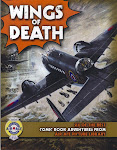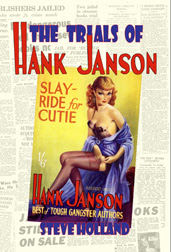Although Clint Eastwood starred in only three Westerns for Sergio Leone, known as the Dollar Trilogy, Leone continued to make movies, travelling to America to shoot Once Upon a Time in the West (1968) for Paramount and Duck, You Sucker! for Euro International Film (1971). The latter, starring Rod Steiger and James Coburn, was to have been directed by Peter Bogdanovitch and produced by Leone. Bogdanovich departed before shooting began because he felt he was not in control of the movie; Leone took over as director. In the US Duck, You Sucker! was distributed by United Artists in a cut version in the summer of 1972 with little impact. They re-released the film with the now more familiar title, A Fistful of Dynamite, to take advantage of the popularity of A Fistful of Dollars (in some European territories it was released as Once Upon a Time... the Revolution, to take advantage of the popularity of Once Upon a Time in the West).
A Fistful of Dynamite by James Lewis (as Duck, You Sucker!, New York, Award Books, Aug 1971)
Tandem 04260-7157-3, 1972, 154pp.
Tandem 0426-15747-8, 1972 [?later recover?], 154pp. Cover by Achilleos
James Lewis also wrote The Consumers Fight-Back Book (1972) for Award.
Because of their tie-in with Award Books, Tandem had published a number of Westerns in their early years (e.g. Rio Chama by Bennett Garland, Gunlock by Sam Bowie) and followed Award into the publishing of movie tie-in Western novelisations with The Wild Bunch (1969) and The Good Guys and the Bad Guys (1970). The former even promoted itself as being written by Brian Fox "author of A Dollar to Die For", linking the new movie to the best-selling book—the first of the Man With No Name spin-offs rather than a genuine movie novelisation. The later Macho Callahan was also credited to Joe Millard "author of For a Few Dollars More" to (presumably) give it a sales boost.
The Wild Bunch by Brian Fox (New York, Award Books, Jun 1969)
Tandem 04260-4407-X, (Sep) 1969, 156pp, 5/-.
----, 2nd imp., 1972, 156pp, 25p.
The Good Guys and the Bad Guys by Joe Millard (New York, Award Books, Nov 1969)
Tandem 04260-4650-1, (May) 1970, 158pp, 5/-.
The McMasters by Dean Owen (New York, Award Books, Jun 1970)
Tandem 04260-4861-X, (Aug) 1970, 126pp.
Valdez is Coming by Elmore Leonard (London, Robert Hale, 1969; Greenwich, CT, Fawcett Gold Medal, Sep 1970)
Tandem 04260-4909-8, (Sep) 1970, 188pp.
Macho Callahan by Joe Millard (New York, Award Books, Aug 1970)
Tandem 04260-5629-9, (May) 1971, 154pp.
Sabata by Brian Fox (New York, Award Books, (cy1969) Sep 1970)
Tandem 04260-5610-9, (May) 1971, 156pp.
Lawman by Grant Freeling (New York, Award Books, 1970)
Tandem 04260-5645-0, (Apr) 1971, 123pp.
Freeling (probably a pseudonym) was also responsible for another Award novelisation, Something Big (Award Books, Oct 1971).
The Hunting Party by Joe Millard (New York, Award Books, Aug 1971)
Tandem 04260-6103-9, 1971, 156pp.
The Valdez Horses by Lee Hoffman (Garden City, NY, Doubleday, 1967)
Tandem 04250-6752-5, (Aug) 1972, 158pp.
Chato's Land by Joe Millard (New York, Award Books, (cy1971) Nov 1972)
Tandem 04260-6840-8, (Aug) 1972, 160pp, 25p.
The posse rode out from Arillo on a vengeance hunt, hunting the Apache half-breed who had shot the sheriff.There were two more Sabata books published in the USA which I believe were not reprinted in the UK, but possibly distributed here. The Sabata series was filmed by P.E.A., the production company responsible for the Dollars trilogy, and starred Lee Van Cleef. The original Sabata movie, Ehi amico ... c'è Sabata, hai chiuso!, was released in Italy in 1969 and in the US in September 1970, accompanied by a novelisation by Brian Fox ("author of The Wild Bunch"), which can be seen above. P.E.A. wanted to make a sequel and wanted Lee Van Cleef to reprise his role as Sabata. Unfortunately for P.E.A., Van Cleef was filming another role at the time for The Magnificent Seven Ride, playing Marshal Chris Adams, a character played in the original Magnificent Seven movie by Yul Brynner. Instead, the Sabata sequel became Indio Black, sai che ti dico: Sei un gran figlio di... and featured a character called Indio Black, played ... by Yul Brynner!
__They rode into a savage, hostile land, where the sun burned down on them, coyote and vulture dogged their trail, waiting hopefully for man or horse to die, and Chato, at home in that land as they could never be, lured them deeper into the desert of canyons and salt flats, picking them off one by one as he liked.
__What had started out as a grand hunt soon lost its savour when the prey turned on the pack, for it takes more than a twelve-man posse to run down an Apache, and what Chato didn't destroy, Chato's land would.
Charles Bronson and Jack Palance star in the Michael Winner film "Chato's Land", co-starring Richard Basehart, James Whitmore and Simon Oakland. Produced and directed by Michael Winner. Written by Gerald Wilson. United Artists, Entertainment from Transamerica Corporation.
But the original Sabata had proven popular, so Indio Black was released in the USA in 1971 as Adiós, Sabata. To confuse matters further, Van Cleef was available for the next movie, È tornato Sabata ... hai chiuso un'altra volta (1971), released in the US as The Return of Sabata, and the three films are often considered a trilogy.
An odd fact to end on: Willis Todhunter Ballard originally wanted to use the pseudonym Sam Bowie on the novelisation of Return of Sabata, a pen-name he had recently used on the Ace Books novelisation of Chisum—perhaps to give the book a sales boost as the John Wayne adaptation probably outsold Sabata. In any event, Award retained Brian Fox as the byline for the series.
Adiós, Sabata by Alice Denham (New York, Popular Library, (cy1970) Oct 1971)
The Return of Sabata by Brian Fox (New York, Award Books, (cy1971) Dec 1972)
































































Great to see these. I had all the North American editions.
ReplyDeleteJust an FYI about 'Indio Black'/'Adios,Sabata': The reason a tie-in probably wasn't issued in Britain is that the film was titled 'The Bounty Hunters' for the U.K..